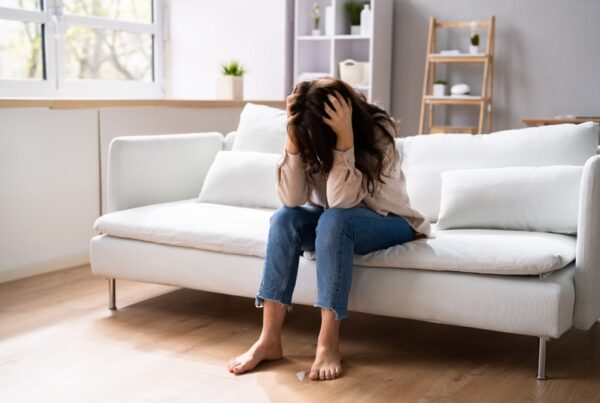The novel coronavirus, also referred to as COVID-19, traveled rampantly through the world, affecting millions of individuals in a variety of ways. In efforts to slow the spread of the virus, states all across America instituted social distancing guidelines, implemented sporadic stay-at-home orders for all non-essential workers, prohibited in-restaurant dining, closed schools, theaters, exercise studios, museums, public libraries, and more. As the guidelines have evolved to support a new norm, and we continue to move toward a pre-pandemic lifestyle, people are left with the mental and emotional fallout from surviving these social distance mandates for extended periods of time. The anxiety and fear surrounding contracting COVID-19, including the extensive list of severe short-term effects as well as the unknown long-term effects remain deeply ingrained in the collective consciousness.
What Is Re-Entry Anxiety?
As its name indicates, re-entry anxiety is a specific form of stress related to the fear of being unable to adapt to previously established routines. The University of Iowa Hospitals & Clinics further explains that “re-entry anxiety refers to fear that can accompany letting go of the safeguards that protected us during the COVID-19 pandemic and our re-entry into a world that has been changed by the virus.” This is not an uncommon phenomenon, as results from a 2021 American Psychological Association (APA) survey found that nearly half of Americans reported feeling uncomfortable about readjusting to in-person interactions, and a similar number claimed to experience adverse emotional reactions, including anxiety, when questioned about returning to a pre-pandemic lifestyle.
How To Handle Re-Entry Anxiety
Fortunately, there are ways to help diminish the natural discomforts associated with adjusting to a more public life. To overcome your re-entry anxiety, consider the following suggestions, provided by leading experts:
- Start small: to build your confidence and set yourself up for success, start with a small achievable goal that allows you to re-engage with the world and as your comfort level increases, gradually work your way up to more challenging and immersive experiences.
- Cultivate a robust supply of relaxation tools and techniques: try out as many different relaxation methods (e.g., meditation, yoga, reading, listening to music, journaling, etc.) as you can to figure out what resonates with you best. Research has found that meditation can help lower blood pressure, reduce feelings of anxiety and depression, improve insomnia, and more.
- Be kind to yourself: avoid self-criticism, treat yourself with respect, and be patient—remember that change takes time.
- Take care of your body: practicing healthy habits can improve your mental health. Make sure to:
- Eat nutritious meals
- Avoid smoking, alcohol, and other drugs
- Stay hydrated and drink plenty of water
- Get enough sleep
- Exercise regularly
- Breathe: ground yourself by focusing on slowing down your breath. This will help pull your focus away from your symptoms and onto your breath.
- Acknowledge your feelings: instead of trying to avoid them, by acknowledging and naming your feelings, you can help diffuse and let go of your angst.
It is helpful to bear in mind that re-entry anxiety is not only normal and to be expected, but in the current post-pandemic climate, it serves as an evolutionarily protective. Still, although some level of anxiety is typical when facing significant life changes, it is important to distinguish between reasonable levels of anxiety and those that may signal a more significant issue. When re-entry anxiety becomes excessive or begins to interfere with daily functioning, it may be advantageous to pursue guidance from a mental health professional.
Treatment In Calabasas
Calabasas is a city in California. It is a well-known suburb of Los Angeles, located west of the San Fernando Valley and north of the Santa Monica Mountains. Over the past decade, the city of Calabasas has grown in its reputation for luxury as well as for privacy which makes it a hidden gem for residential living for society’s elite, and one of the most desirable destinations in Los Angeles County. It is also home to a plethora of highly qualified mental health clinicians providing an array of therapeutic services and treatment options.
The information above is provided for the use of informational purposes only. The above content is not to be substituted for professional advice, diagnosis, or treatment, as in no way is it intended as an attempt to practice medicine, give specific medical advice, including, without limitation, advice concerning the topic of mental health. As such, please do not use any material provided above to disregard professional advice or delay seeking treatment.




